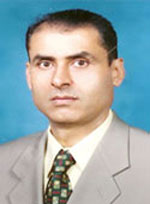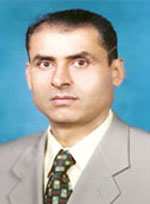


Dr. Omar Abdul Ghani Trad was born and raised in Lebanon. He graduated in medicine from the University of Bucharest in 1987 and moved on to the American University of Beirut where he trained himself for five years and took his Masters in Pediatrics.
He is currently a senior member of the staff of the Department of Pediatrics in Tawam Hospital, Al Ain UAE. He teaches undergraduate medical students and interns of Faculty of Medicine and Health Sciences. Although he is involved in care of asthma patients, patients with first seizure, status epilepticus, tumor lysis etc, , his major research interest has been Pediatric Oncology.
He is a member of the European Society of Pediatric Infectious Diseases (ESPID. Pan Arab Society of Pediatric Oncology (PASPO), International Society of Pediatric Oncology (SIOP) and American Society of the Clinical Oncology (ASCO). He has published a number of original papers in Pediatric Tropical Medicine, Pediatric Oncology and Pediatric Hematology and Oncology journals. Noteworthy here is that he is a regular contributor to the Emirates Medical Journal.
Dr. Trad has maintained a strong interest in tumors in pediatric age group. In his observation, during the past two decades there have been significant improvements in the survival of children with different types of cancer.
In their award winning paper published in EMJ, Dr. Trad and his colleagues present an analysis of their experience in the management of 53 children (25 males and 28 females) with neuroblastoma in this part of the world. It is a retrospective study of all children treated for neuroblasotma at Tawam hospital between September 1982 and January 2001. Their medical records were reviewed for age at diagnosis, sex, nationality, mode of presentation, site of neuroblastoma, investigation, stage, preoperative treatment, type of surgery, postoperative treatment and outcome. Their ages at presentation ranged from birth to 10 years (mean 2.9 years). The majority of these patients (83%) had intra abdominal neuroblastoma. Five had Intrathoracic neuroblastoma, 2 had intracranial neuroblastoma, 1 had oropharyngeal neuroblastoma, and one had metastatic neuroblastoma without known primary. The distribution of patients according to stage was as follows. 3 stage I. 5 stage II. 9 stage III, 33 stage IV and 3 stage IV-S. All our patients with stage I, II, III, and IV-S survived. A large number of patients (62.3%) presented with advanced stage IV neuroblastoma, and this contributed to the high mortality rate (34%) in this series.
This situation, in the opinion of Trad and colleagues should be improved by early diagnosis, early referral and early initiation of treatment. The exact incidence of neuroblastoma in the United Arab Emirates (UAE) is not known, but it accounts for about 7.5% of the total number of malignancies in the pediatric age group. The recently established cancer registry in the UAE should prove useful regarding the incidence and prevalence of cancer in the future. The study of the epidemiology and patern of cancer is of paramount importance for the establishment of both oreventive and therapeutic measures.
Dr. Omar Abdul Ghani Trad is awarded for his original article published in the E itratm Medicai Journal from inside UAE for the year 2003-2004.